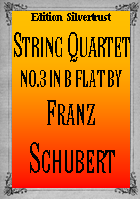Presents
Franz Schubert
 |
|
String Quartet No.3 in B flat Major, D.36
Franz Schubert (1797-1828), one of the most famous composers of all time, requires no introduction. However, his first six string quartets are virtually unknown and rarely heard let alone played. To learn more about their background and why that is Click Here.
Schubert completed his Third Quartet in the last part of February 1813. He had successfully finished his course of instruction under Wenzel Ruzicka the previous term and was passed on to Imperial Court Kapellmeister Antonio Salieri, the teacher of the most advanced students. Ruzicka noted in his final evaluation of Schubert, “He has learned it from God.” Salieri, who taught Schubert harmony, counterpoint and Italian vocal composition, was no less impressed. His end of term reports included such remarks as “A remarkable musical talent.” and “...an exceptional talent for music.” Though by today’s tastes, Salieri’s compositions seem dry and anemic, no one can accuse him of being unable to recognize talent. So jealous was he of Mozart that he was forced to make a sworn public statement that he had had no hand in poisoning him. Beethoven, with whom Salieri was quite impressed, studied with the Italian off and on for nearly 10 years. As for Schubert, Salieri became a mentor. Beyond his role of teacher, he interested himself in all of the young man’s early compositions, not just those written for class. Several of Schubert’s manuscripts from this time are copiously annotated by Salieri, String Quartet No.3 is among them.
The opening movement is an Allegro in B Flat Major. The interplay between the fetching main theme in the violins and the harmony of running 8th notes in the cello and later the viola too is quite interesting. It starts as counterpoint but eventually morphs into the second theme. If this were not enough, two brilliant contrapuntal fugal episodes grace this by turns charming, dramatic and very original sounding movement. The part-writing, in particular the treatment of the lower voices, is excellent and, from the standpoint of equality, exceeds virtually all of Haydn’s quartets, with the possible exception of Op.20 No.2, and matches Beethoven’s Op.18. The second movement, Andante, begins with a fine melody which is introduced by the cello and then taken over by the violin. But far more striking is a lengthy chromatic episode which appears dramatically in the cello’s lower registers. It ends in a sudden tremolo, an effect Schubert would use time and again, most notably in his last quartet, with great success. The third movement, Menuetto, Allegro non troppo, is an “echt Wiener Minuet”—a real Viennese Minuet in sound and feel. That this is so is really quite extraordinary since the thematic material is quite slight and extremely simple. The treatment shows a considerable advance over his First Quartet. The thematic material of the trio is perhaps even slighter than the Minuet, yet again Schubert makes it into something quite effective. Perhaps some of this may be attributed to his lessons with Salieri. The finale, Allegretto, begins with a genial theme Schubert develops exploring many different possibilities. There is also a lovely second theme which makes two rather brief appearances but is not developed. The part-writing is good and the use of 32nd notes, just short of creating a pure tremolo, make their appearance at the dramatic heights on two occasions. For the first time, the lead violin is taken into its highest registers while the second plays octaves below with telling effect.
This work will not only please amateurs but could be used by professionals as a fresh substitute for a Haydn or Mozart quartet. Again, we are not only pleased to offer this quartet but also the first three quartets as a book at a special price.
| (A) String Quartet No.3-Parts | $24.95 |
|
|
(B) String Quartet No.3-Parts & Score |
$31.95 |
|
| (C) String Quartet Nos.1-3-Parts | $64.95 |
|
| (C) String Quartet Nos.1-3-Parts & Score | $84.95 |
|